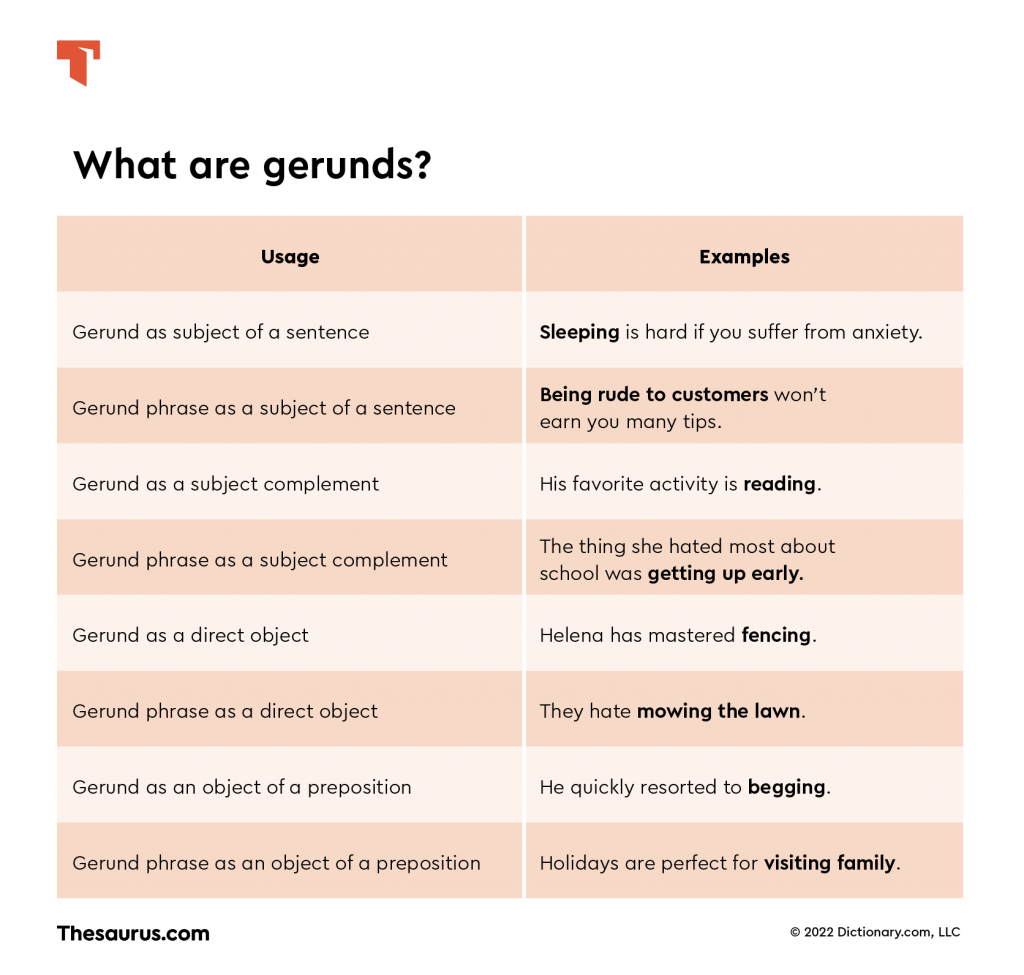Sometimes, looks can be deceiving. Jumping to conclusions about things can land you in trouble. This is certainly the case when it comes to words we use in English. Take gerunds for example: they look a lot like verbs but they don’t act like them at all. In fact, they prefer to act like nouns.
What gives? Gerunds come from verbs, after all, so why do they refuse to act like them? Are they going through a rebellious phase? Do nouns throw better parties? It isn’t our place to judge the habits of parts of speech, but it is worth taking a closer look at gerunds to figure out the best ways to use them in sentences. (You don’t want their identity crisis to make you look like a fool who uses improper grammar!)
What is a gerund?
A gerund is a form of a verb that ends in -ing that is used as a noun. As you may know, a verb is a word that refers to actions or states of being, and a noun is a word that we use to refer to people, places, things, and ideas. A gerund is like a blend of verbs and nouns. It looks like a verb, but it acts like a noun. For example, the word swimming is an example of a gerund. We can use the word swimming in a sentence as a noun to refer to the act of moving around in water as in Swimming is fun. When used in sentences, gerunds are treated as third person singular nouns (like he, she, and it).
A gerund phrase is a phrase that includes the gerund, its objects, and its modifiers. Because they are derived from verbs, gerunds can take objects or be modified by adverbs. Just like noun phrases, gerund phrases are treated as nouns in sentences. In the sentence I love carefully collecting action figures, the gerund phrase carefully collecting action figures is the direct object (phrase).
To turn a verb into a gerund, all you need to do is add -ing to the base form of a verb. The base form is the form of a verb you will find if you look up a verb in our dictionary. When making a gerund, there are a few things to watch out for:
- Unless a verb ends in -ee or -ie, we drop the final -e in a verb before adding -ing as in joking, taking, and making.
- If a verb ends in -ee, add -ing like normal as in agreeing, fleeing, and seeing.
- If a verb ends in -ie, replace it with –y before adding -ing as in lying (lie), tying (tie), and dying (die).
As with present participles, sometimes we double a final consonant when making a gerund. For example, the gerund of run is running. Generally speaking, these are the rules of when to double a final consonant to form a gerund:
- If a one-syllable verb ends in consonant-vowel-consonant, double the final consonant, as in strumming, cutting, blurring, and spinning.
- Rule 1 is ignored if the verb ends in –w or –y as in knowing or playing.
- For longer verbs that end in consonant-vowel-consonant, we only double the final consonant if the last syllable is stressed:
-
- Stressed: omitting, referring, forgetting
- Unstressed: visiting, eliciting, fidgeting
List of gerunds
You can turn any verb you want (except a modal verb) into a gerund. Here is a list of gerunds formed from a variety of verbs:
- singing
- meditating
- cooking
- being
- having
- dancing
- philosophizing
Examples of gerunds in a sentence
Let’s take a look at some sentences that use gerunds:
- Baking is one of my favorite hobbies.
- She loves reading books to the children at the library.
- When it comes to hunting deer, nobody is better than Leroy.
- Katey much prefers playing with kittens to raising them.
- The movie star has a very strenuous fitness routine that involves dieting, jogging, sprinting, running, and lifting weights.
How do gerunds function?
Just like nouns and noun phrases, gerunds and gerund phrases can be used in several different ways in sentences. In general, there are four different ways that we use gerunds: as subjects, subject complements, direct objects, and objects of prepositions.
Gerunds as nouns
As stated already, gerunds look like verbs but behave like nouns. Likewise, gerund phrases behave like noun phrases. In practice, this means that gerunds and gerund phrases can be the subject of sentences/clauses or be the subject complement connected to the subject by an auxiliary verb (helping verb). Let’s look at examples of each of these ideas:
- Gerund as a subject: Sleeping is hard if you suffer from anxiety.
- Gerund phrase as a subject: Being rude to customers won’t earn you many tips.
- Gerund as a subject complement: His favorite activity is reading.
- Gerund phrase as a subject complement: The thing she hated most about school was getting up early.
Gerunds as objects
Just like nouns and noun phrases, gerunds and gerund phrases can be used as objects in sentences/clauses. They can be used as both direct objects as well as objects of prepositions:
- Gerund as a direct object: Helena has mastered fencing.
- Gerund phrase as a direct object: They hate mowing the lawn.
- Gerund as an object of a preposition: He quickly resorted to begging.
- Gerund phrase as an object of a preposition: Holidays are perfect for visiting family.
Gerund vs. participle phrase
Gerunds have the exact same spelling as present participles of verbs. For example, both the gerund and present participle of go is going. However, gerunds and participles serve different functions in sentences. The biggest difference between the two is that gerunds are used as nouns while present participles are not. Instead, present participles are used to form the continuous verb tenses and are used in participle phrases. Unlike gerunds, participle phrases are used as adjectives and not nouns. For example, in the sentence Feeling confident, she sang with passion, the participle phrase feeling confident modifies the pronoun she.
To review, gerunds are used as nouns, while present participles are used in verb tenses and participle phrases are used as adjectives. The following sentences show how gerunds and participles/participial phrases are used differently.
- Cooking is a useful skill to learn. (Cooking is a gerund used as a noun.)
- The chefs are cooking steaks. (Cooking is a present participle used to form the present continuous tense.)
- Chef Romero, cooking with gusto, prepared a 10-course meal. (Cooking is used as a participle in a participle phrase that modifies the noun Chef Romero.)
If you are still a little confused, remember that gerunds are used as nouns. This means that gerunds can only do the same jobs that nouns do: act as subjects, subject complements, and objects. Gerunds don’t act as modifiers and are not used as verbs.
Let’s look at a few more sentences. Read each sentence carefully and see if you can tell if the bolded word is a gerund or a participle.
- Snowboarding seems pretty dangerous.
- We were surfing all day yesterday.
- Staring blankly at his test, Craig knew he was going to fail.
- Diana quickly grew tired of the constant complaining of the rude customers.
- The magazine is focused on fishing and the lives of fishermen.
- The creepy ghost was speaking gibberish.
- Giving speeches is hard for most people.
- The brave adventurers, knowing just what to do, rescued the lost prince.
Write smarter with Grammar Coach™
We’ve got a gerund for you: perfecting! As in, perfecting your writing is perfectly possible with Thesaurus.com’s Grammar Coach™. This tool uses machine learning technology uniquely designed to catch grammar and spelling errors in your writing. Its Synonym Swap will find the best nouns, adjectives, and more to help say what you really mean, guiding you toward clearer, stronger, writing. Grammar Coach™ is here to help you with any assignment or project you have!
Are you ready to take the official gerunds quiz now? Take it here!
Answers: 1. Gerund 2. Participle, continuous verb tense 3. Participle 4. Gerund 5. Gerund 6. Participle, continuous verb tense 7. Gerund 8. Participle
















